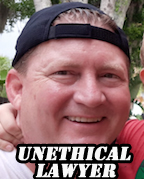BY SALLY KANE
Updated June 25, 2019
Cases are won and lost based on the quality of your legal team. Not all lawyers are equally skilled, competent or ethical. Knowing how to find a good lawyer, and how to avoid a bad one, is not always easy. Trust your instincts and watch for the red flags below.
Work Habits
An attorney’s work habits are one of the largest indicators of competence. The following red flags may indicate that it’s time to find new legal representation.
- Unreturned phone calls – A lawyer who fails to return phone calls promptly, or at all, does not place a premium on client service. He may be too busy with other cases, uncertain with how to proceed with your case or ignoring your matter altogether.
- Unanswered e-mails – Like unanswered phone calls, unanswered emails can indicate that the lawyer is too busy, stressed or overwhelmed to handle your case or is not making your matter a priority.
- Missed deadlines – Missing deadlines, especially court filing deadlines, can seriously damage your case. If a lawyer consistently misses deadlines, it is best to terminate the relationship and move on.
- Poor attitude – A lawyer who displays a condescending, uncommunicative, rude, impatient or otherwise poor attitude may be difficult to work with. A poor attorney-client relationship may create conflict, tension, and ill-will.
- Lack of proper calendaring system – A reliable, organized calendaring system is critical to meeting deadlines and prioritizing multiple obligations. A lack of a proper calendaring system can lead to missed deadlines and other disasters.
- A promise of a court victory or successful outcome – An attorney should never promise his client a specific outcome, no matter how likely that outcome may be. Be wary of promises of a sure-fire victory.
- Refusal to provide references – A refusal to provide references or let you talk with past clients indicates that the lawyer had problems with past clients that he does not want you to know about.
Work Premises
A lawyer’s work premises, from the building location and exterior to the reception room, conference room and offices, can speak volumes about a lawyer’s work practices and clientele. Below are a few signs that all is not well.
- Office space in a state of disrepair – Office space or property in poor disrepair can signal financial problems on the part of the lawyer.
- A large number of empty offices – A high number of empty offices can signal significant employee turnover, too-rapid growth or financial problems.
- Unkempt, disorderly office – A messy, cluttered office is a red flag for disorganization and inefficiency. Perhaps the lawyer thrives in chaos but do you want to risk losing important paperwork or missing a deadline?
- Stacks of unfiled papers or unopened mail – A backlog of filing or unopened mail may indicate that the lawyer lacks proper support staff or is disorganized, unmotivated or overwhelmed.
Lawyer’s Staff
A look at the lawyer’s staff members and how he interacts with personnel can provide clues to his effectiveness, competence, reliability, and ethics.
- Unhappy staff members – Disgruntled employees or low workplace morale can signal poor lawyer-staff communication, strained relationships and a lack of caring. A lawyer who treats staff poorly—through bullying, verbal abuse, rudeness, and other behavior—can fuel conflict, tension, and ill-will. If the lawyer fails to treat his employees well, will he treat clients well?
- High turnover rate – High employee attrition can signal dissatisfaction with the law firm in general or the lawyer specifically. Committed and satisfied employees are more likely to remain with a firm, regardless of pay or benefits.
- Lack of staff - A lawyer who lacks adequate support staff may be difficult to work with or may be experiencing financial difficulties.
Billing Practices
A lawyer’s billing practices can also raise red flags. Below are a few billing practices to watch.
- Overbilling or excessive billing – Overbilling is a sign that a lawyer or paralegal is inflating the time it took to perform a task (known as “padding time”).
- Vague billing – Your legal bill should explain in detail the tasks performed, who is performing them and when. For example, a phone call should include information as to who made the call, what party they were calling, the nature of the matter and the duration of the call.
- Surcharge on legal expenses – Some law firms add a surcharge to routine expenses such as copying or postage fees as a way to boost profit levels. In most cases, such charges are inappropriate and unethical.
- Hidden expenses – Watch for hidden expenses that were not disclosed at the outset or in the fee agreement or retention agreement.
RULE 4-8.4 MISCONDUCT (a) violate or attempt to violate the Rules of Professional Conduct, knowingly assist or
A lawyer shall not: induce another to do so, or do so through the acts of another;
(b) commit a criminal act that reflects adversely on the lawyer’s honesty, trustworthiness, or fitness as a lawyer in other respects;
(c) engage in conduct involving dishonesty, fraud, deceit, or misrepresentation, except that it shall not be professional misconduct for a lawyer for a criminal law enforcement agency or regulatory agency to advise others about or to supervise another in an undercover investigation, unless prohibited by law or rule, and it shall not be professional misconduct for a lawyer employed in a capacity other than as a lawyer by a criminal law enforcement agency or regulatory agency to participate in an undercover investigation, unless prohibited by law or rule;
(d) engage in conduct in connection with the practice of law that is prejudicial to the administration of justice, including to knowingly, or through callous indifference, disparage, humiliate, or discriminate against litigants, jurors, witnesses, court personnel, or other lawyers on any basis, including, but not limited to, on account of race, ethnicity, gender, religion, national origin, disability, marital status, sexual orientation, age, socioeconomic status, employment, or physical characteristic;
(e) state or imply an ability to influence improperly a government agency or official or to achieve results by means that violate the Rules of Professional Conduct or other law;
(f) knowingly assist a judge or judicial officer in conduct that is a violation of applicable rules of judicial conduct or other law;
(g) fail to respond, in writing, to any official inquiry by bar counsel or a disciplinary agency, as defined elsewhere in these rules, when bar counsel or the agency is conducting an investigation into the lawyer’s conduct. A written response shall be made:
(1) within 15 days of the date of the initial written investigative inquiry by bar counsel, grievance committee, or board of governors;
BRIAN KEISACKER:
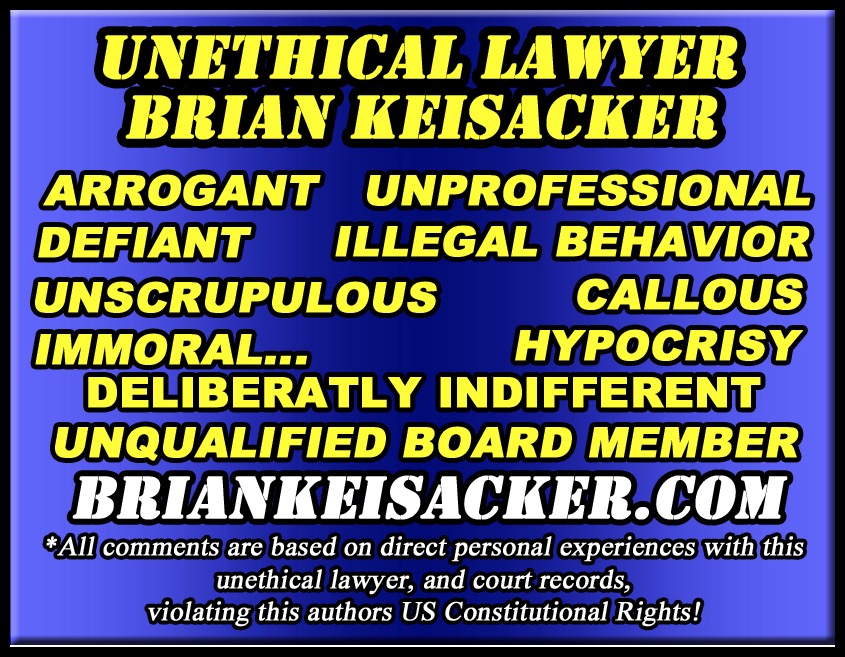
BRIAN KEISACKER:
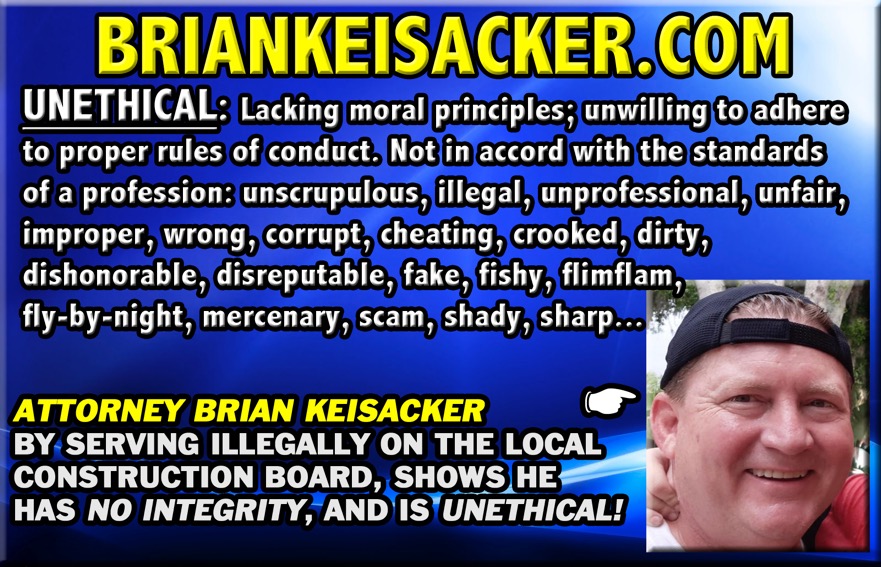
BRIAN KEISACKER:
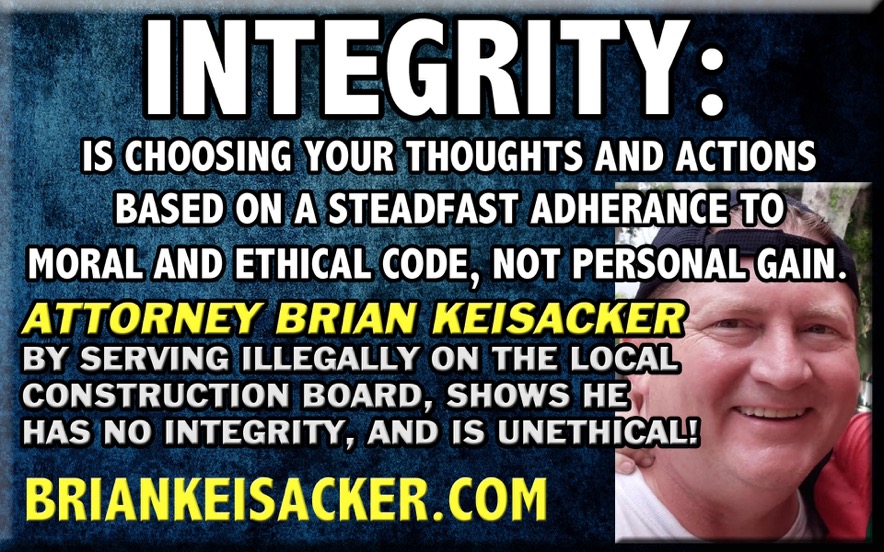
BRIAN KEISACKER:

BRIAN KEISACKER:
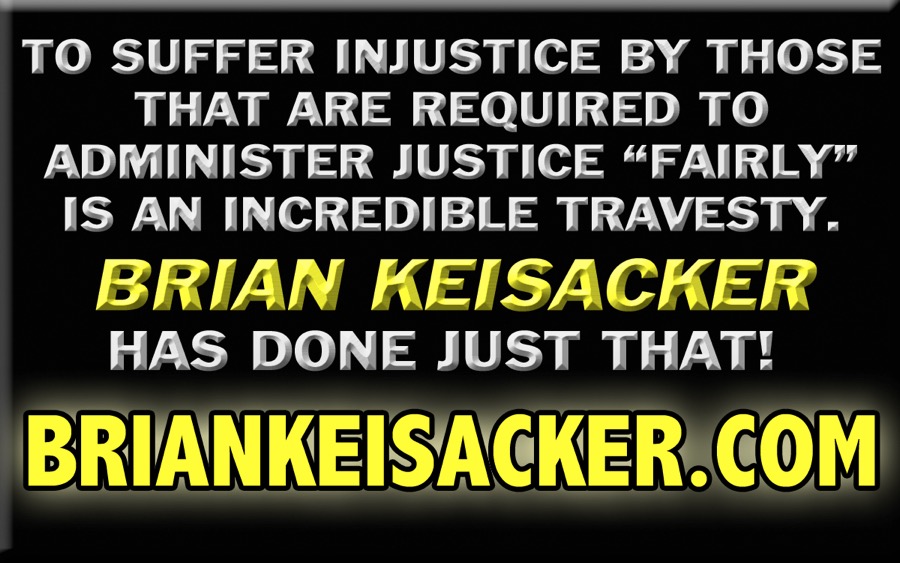
BRIAN KEISACKER:
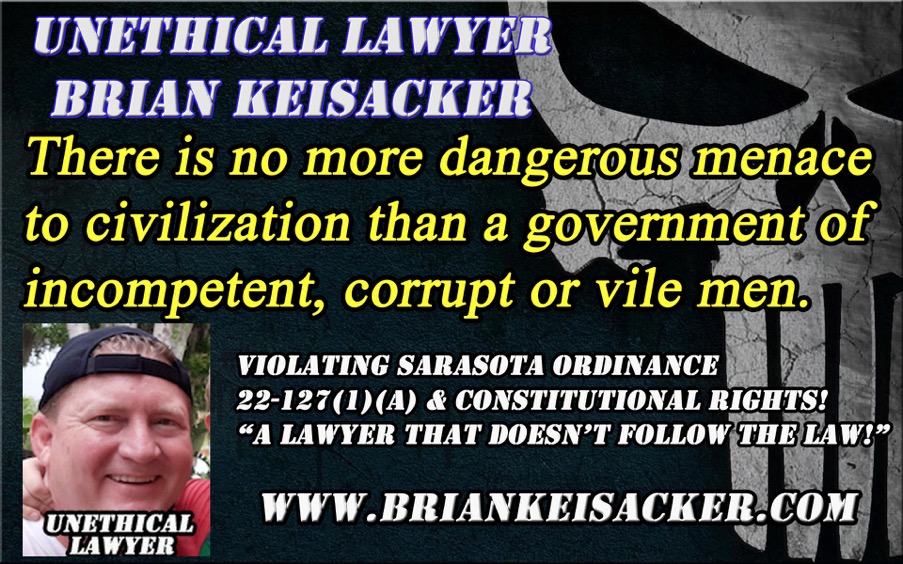
BRIAN KEISACKER:

BRIAN KEISACKER:
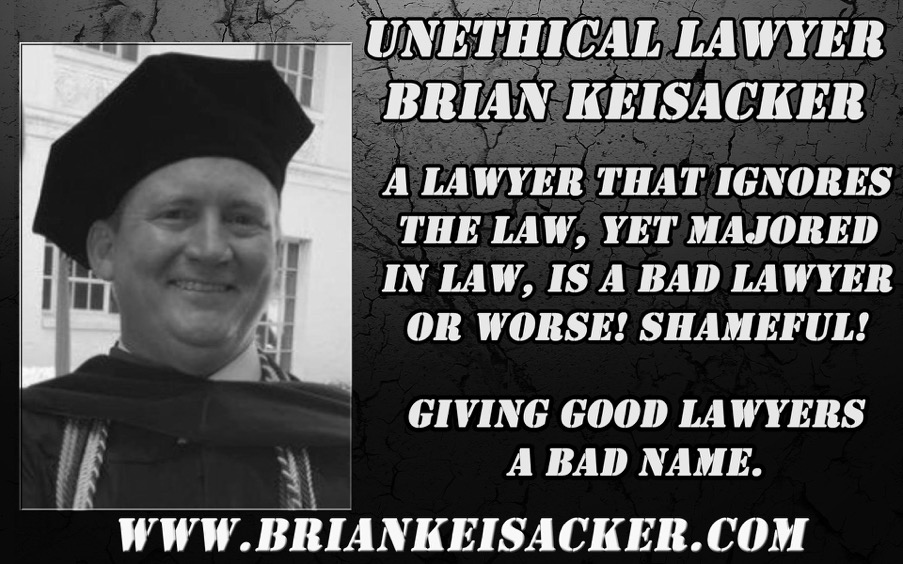
BRIAN KEISACKER:
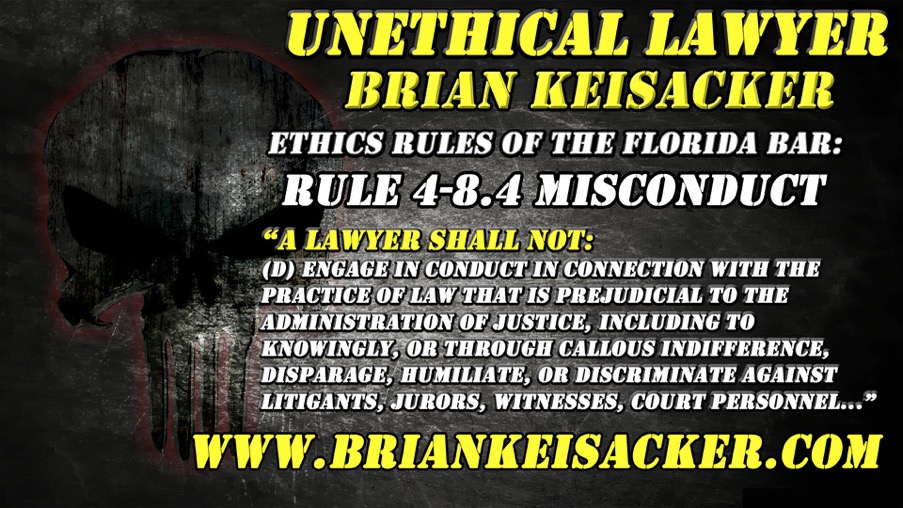
BRIAN KEISACKER:
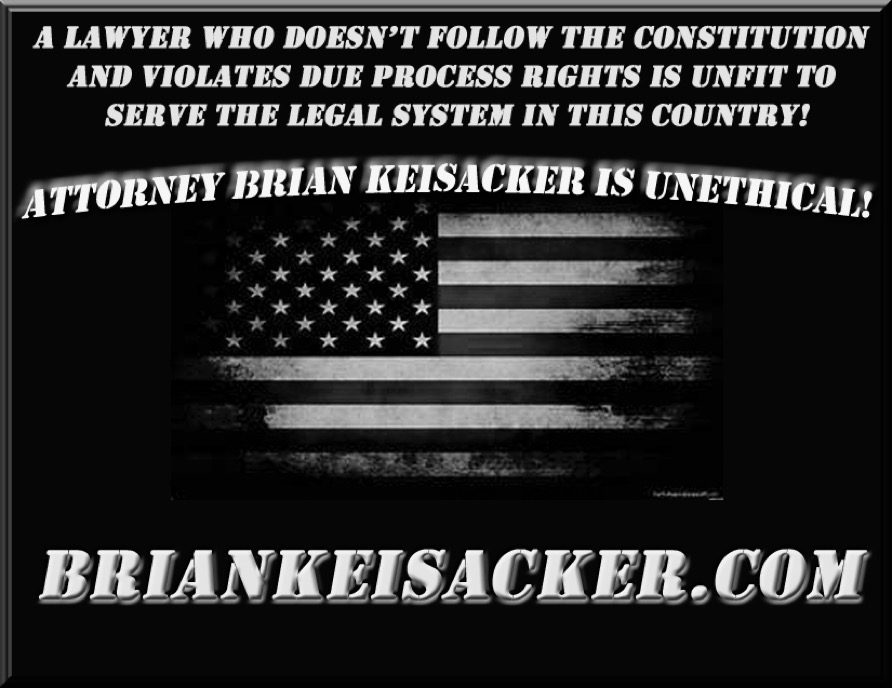
BRIAN KEISACKER:
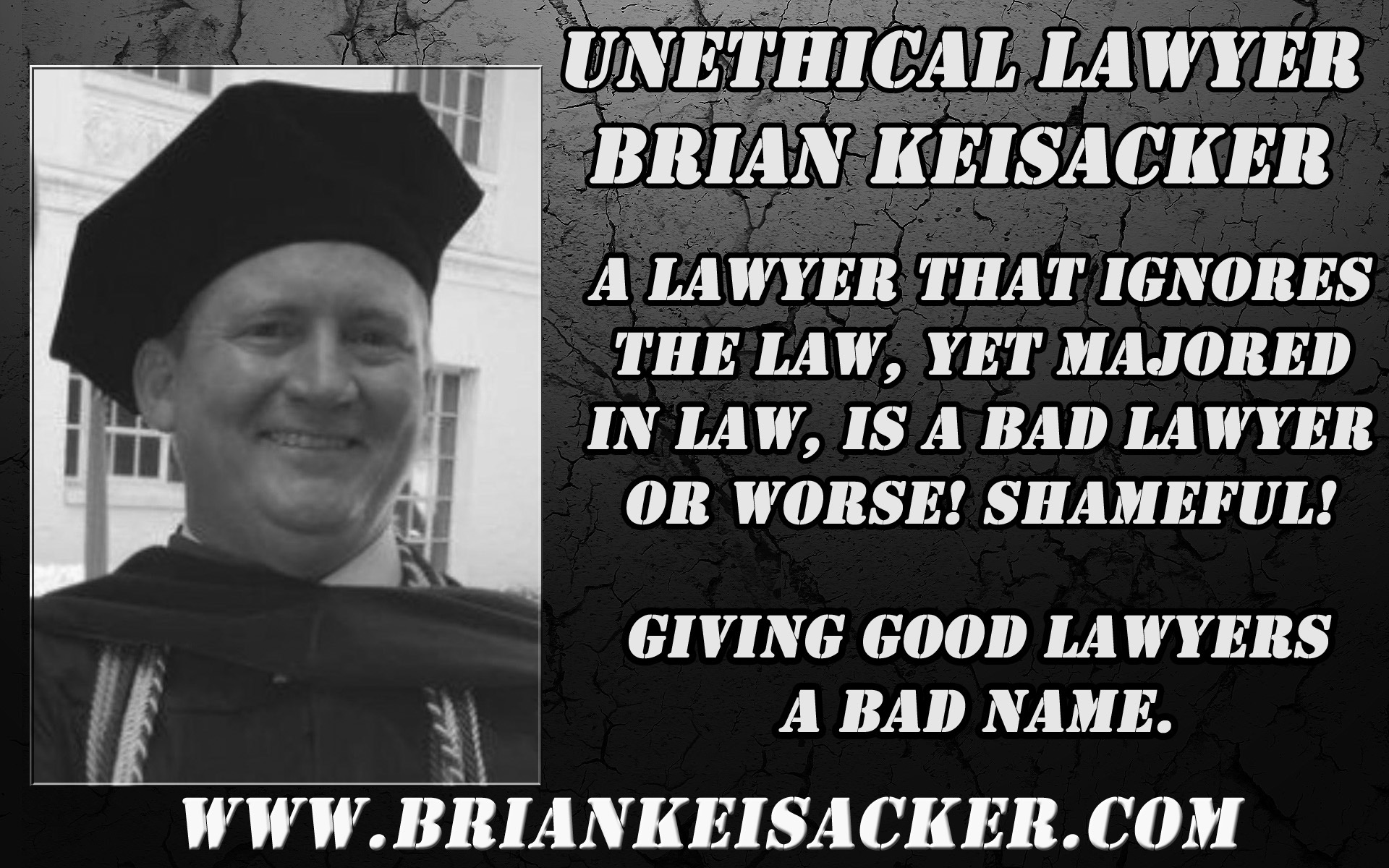
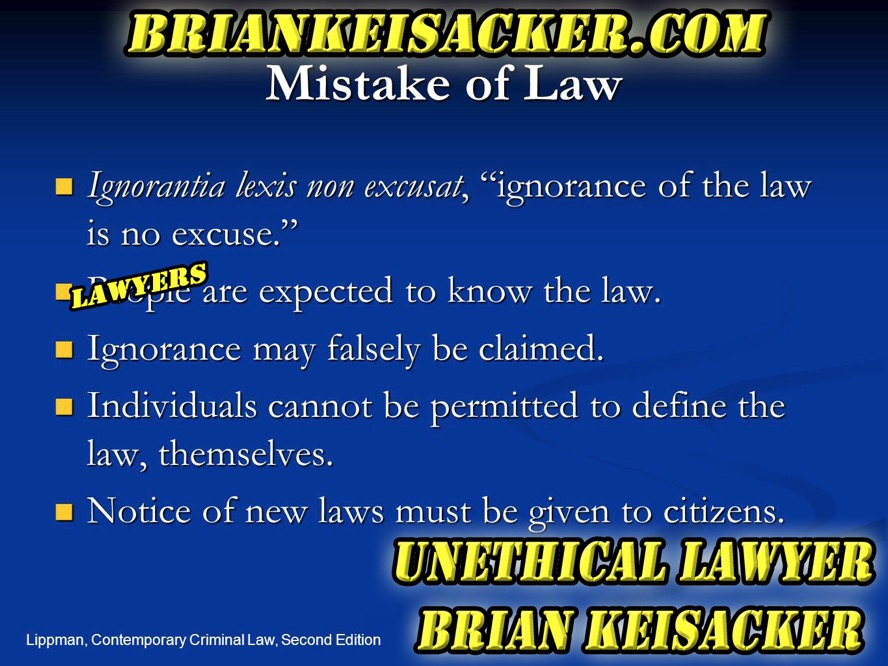
BRIAN KEISACKER:
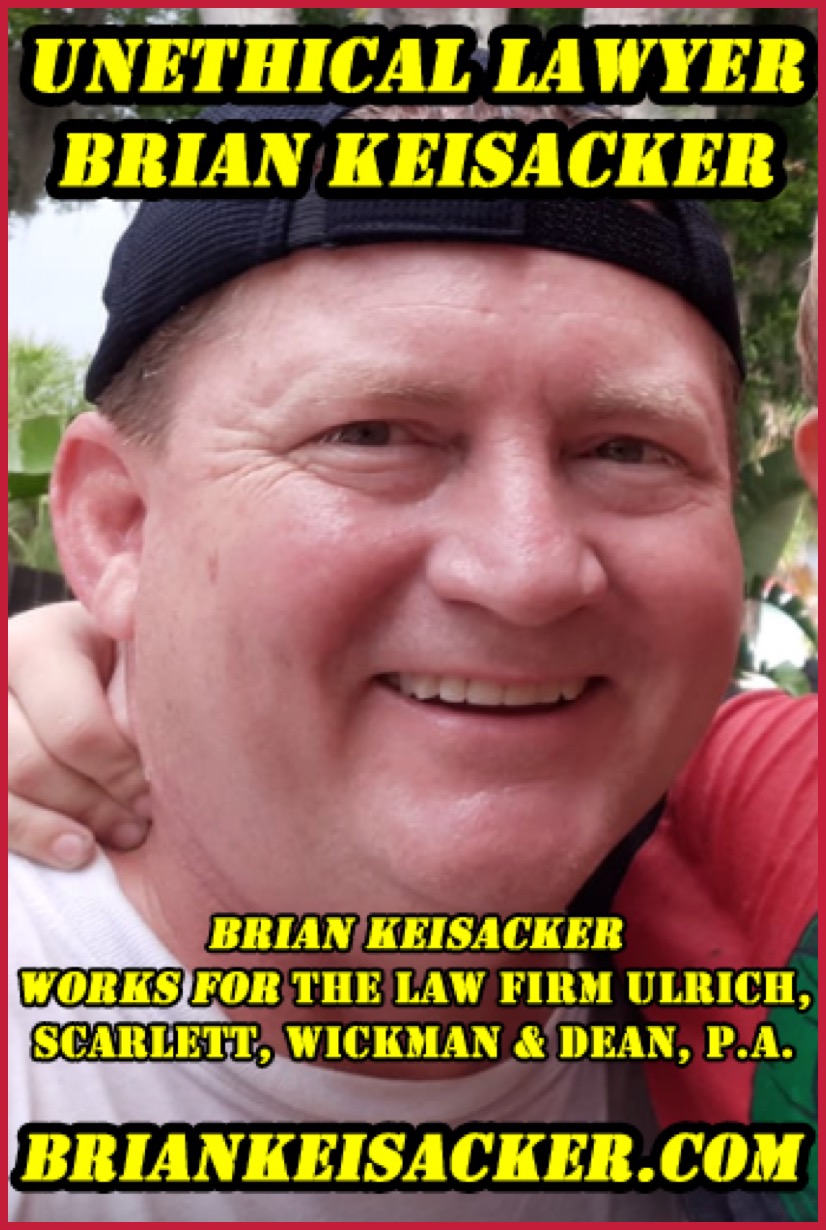
I CERTAINLY WOULD NOT RECOMMEND EVER HIRING THIS UNETHICAL LAWYER - BRIAN KEISACKER!
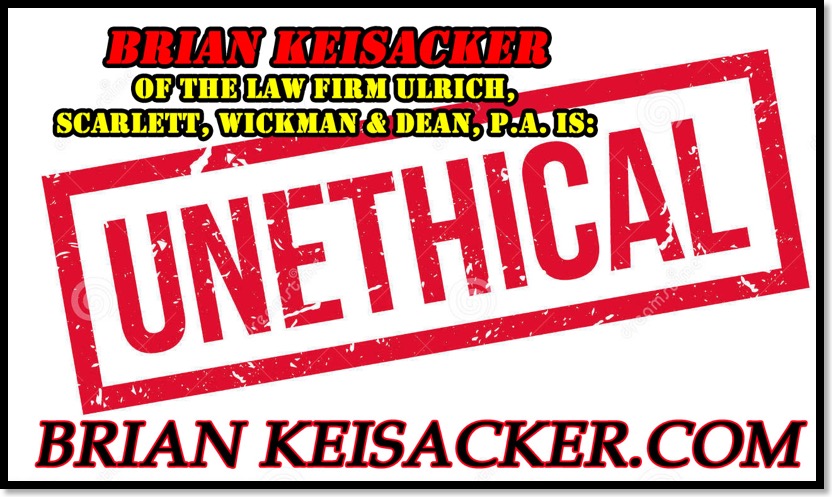
Brian Keisacker works for Ulrich, Scarlet, Wickman & Dean, P.A. in Sarasota, Florida.
One can only apply the facts and deduce that Brian Keisacker is Unethical!
Brian Keisacker
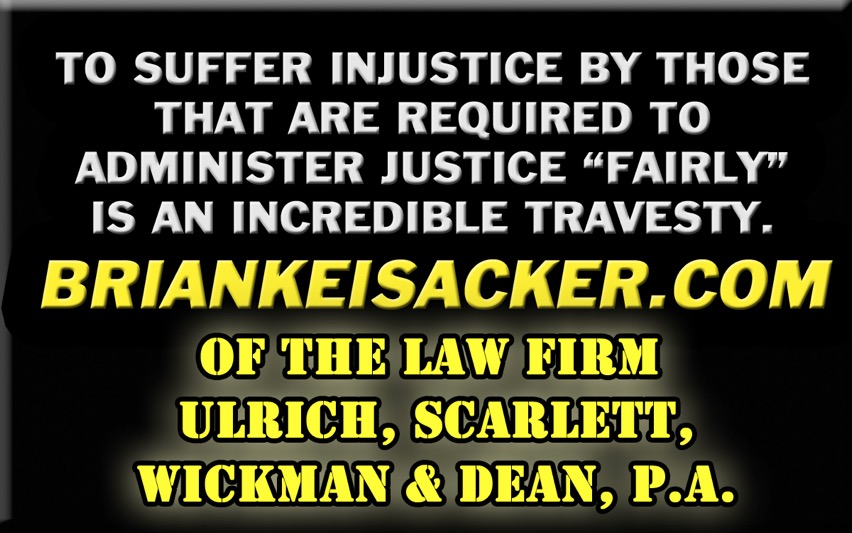
Brian Keisacker
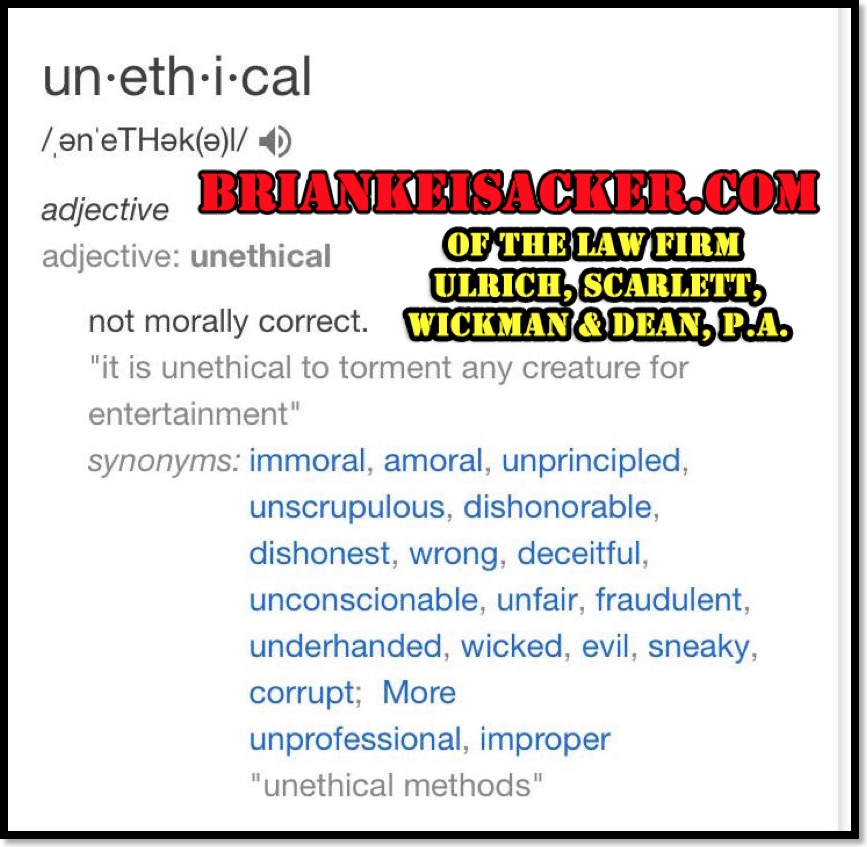
Brian Keisacker
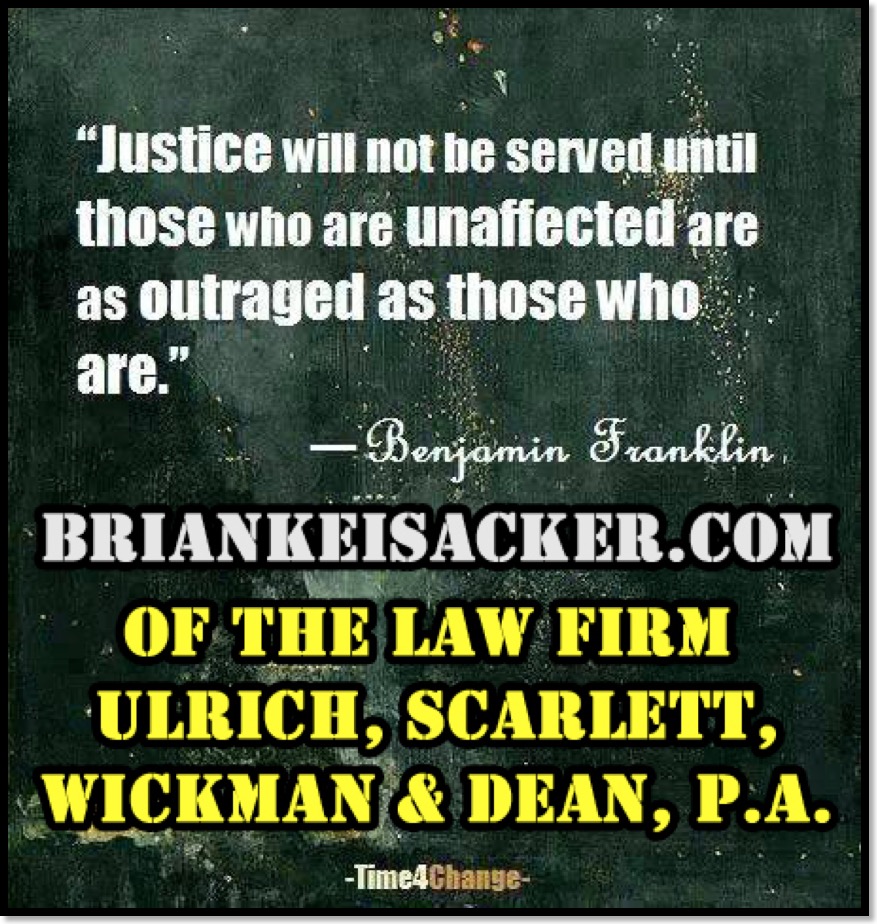
Brian Keisacker

Brian Keisacker

Brian Keisacker
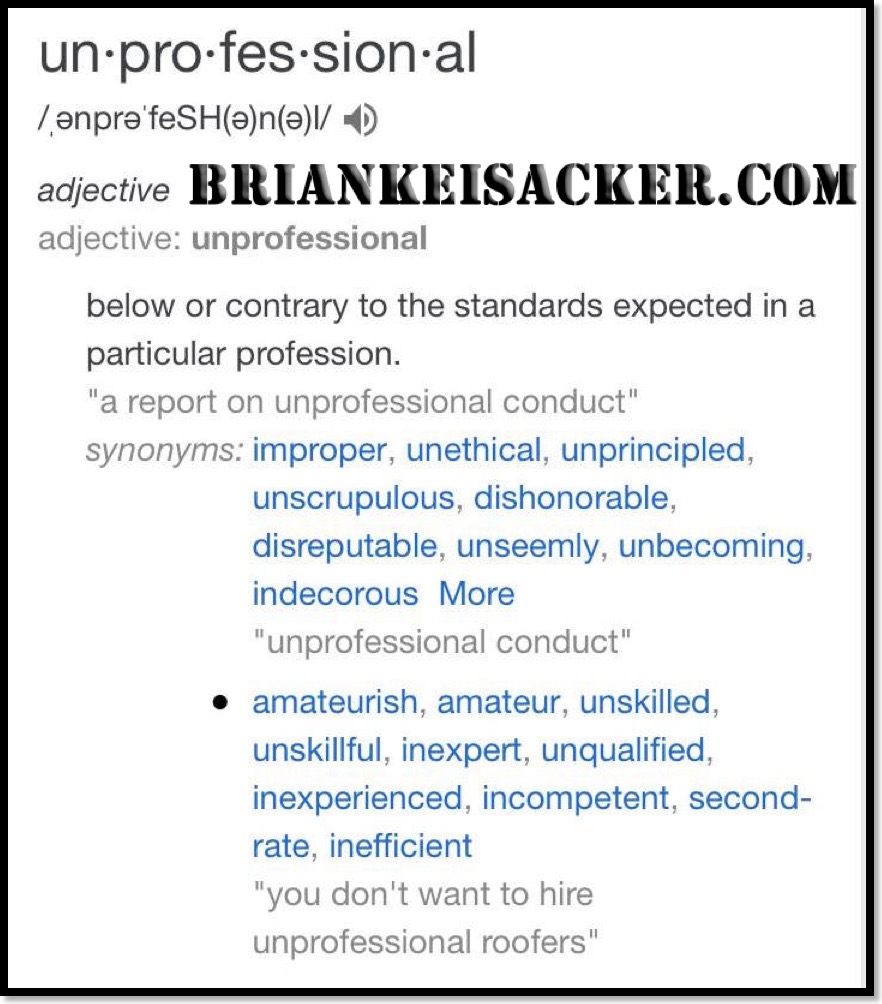
Brian Keisacker would rather be unethical, than follow the Sarasota County Ordinance 22-127(3).
From the transcript of August 15, 2019:
"…Attorney Brian Keisacker, the rules -- the rules regulating the Florida Bar state that a lawyer shall not engage in conduct that is prejudicial to the administration of justice. That rule is under the ethics Chapter 4, which is 4-8.4(d) as in David. I hereby request that you recuse yourself from this hearing and this board."
"…I believe that you're violating the rules regulating the Florida Bar and I believe that it's unethical and you should not be serving on this board. And you've known for a long time that you derive income from the construction industry and are unqualified to serve on this board."
CHAIRMAN KEISACKER: And if you feel that way, I invite you to inform the Florida Bar that you feel I'm in violation --
Arrogance and unethical behavior by Brian Keisacker!
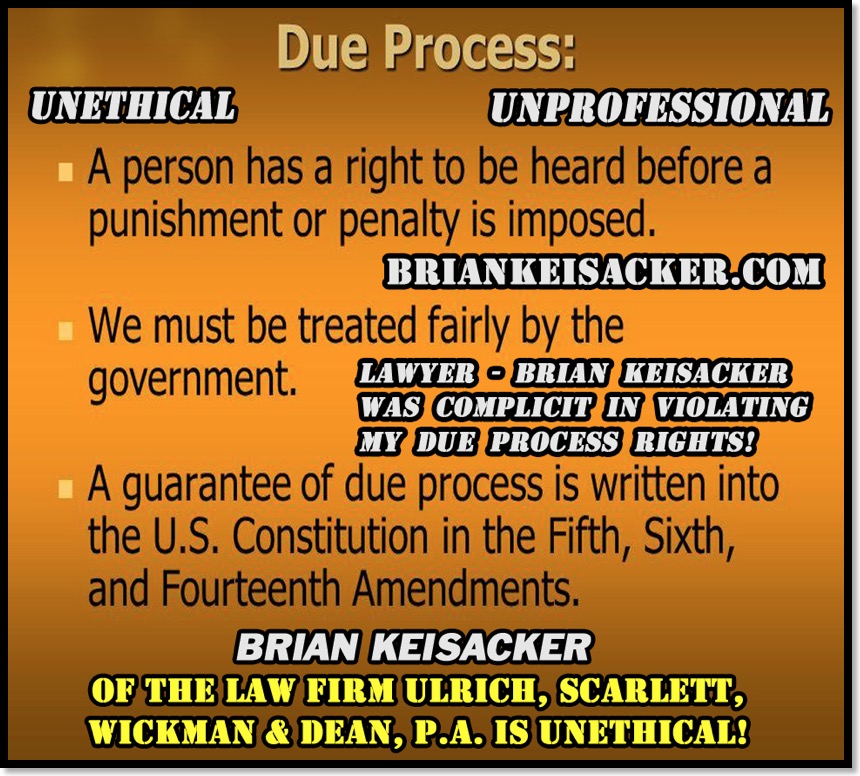
Brian Keisacker
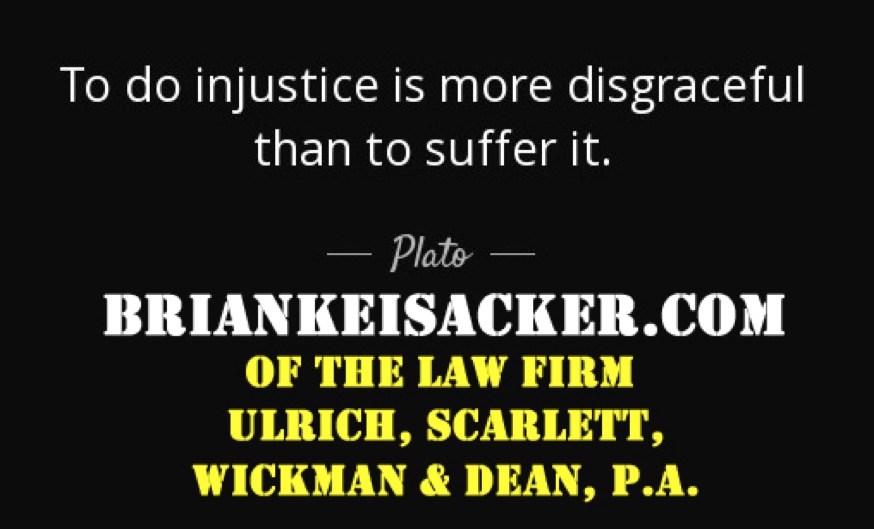
Brian Keisacker
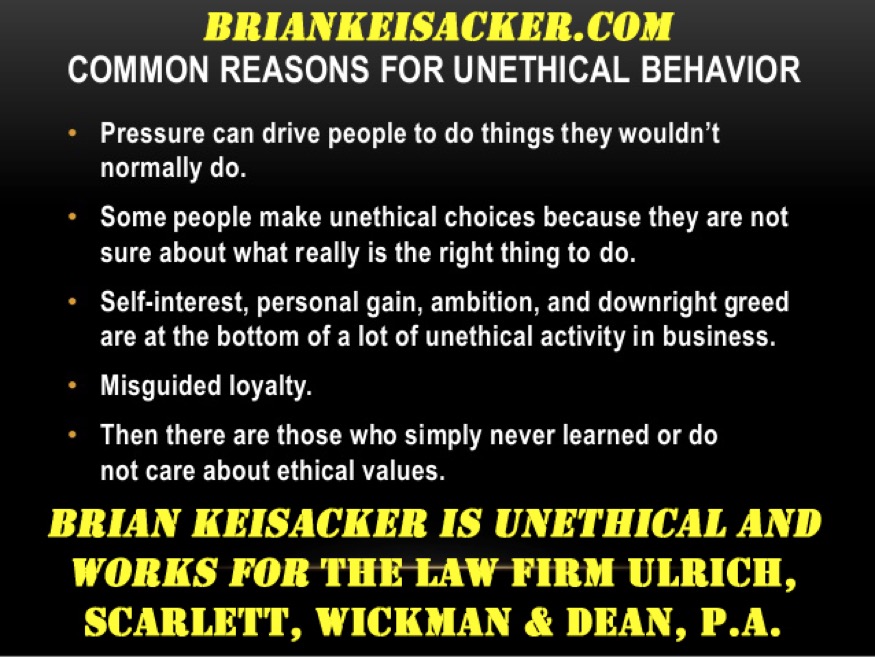
BRIAN KEISACKER

Brian Keisacker
SEE SARASOTA COUNTY ORDINANCE 22-127(3)
BRIAN KEISACKER
Brian Keisacker Sarasota, Florida.
SEE SARASOTA COUNTY ORDINANCE 22-127(3)
- (c) The term "Consumer Representatives" used in this section shall be defined as set forth in F.S. § 489.131(10).
- (3) Qualifications. Architects and Engineers are not required to be professionally registered in the State of Florida as a condition of appointment to a Board. The citizen at large member (Lawyer Brian Keisacker) shall be selected for appointment from Sarasota County resident applicants deriving no income from any source connected with the construction industry. Appointment shall be based on demonstrable training and experience acceptable to the Board of County Commissioners. PLAIN AND SIMPLE! Brian Keisacker is defiant!
- 4) Term of Appointment. Board members shall be appointed for a period of three years. The Board of County Commissioners may relieve Licensing Board members of their appointment for failure to attend a majority of the meetings each fiscal year. The appointed members of the Boards shall proceed to select a Chairman, Vice Chairman and a Secretary.
It is our beliefs from personal experiences with lawyer Brian D. Keisacker, has violated Respondent’s constitution rights where Brian D. Keisacker as chairman of the Sarasota County General Contractors Licensing and Examining Board did not accord due process guaranteed under the United States Constitution and served as a consumer representative, Brian Keisacker is in clear violation of Sarasota County Ordinance 22-127(3), where Brian Keisacker earns income from the construction industry.
Yet Brian Keisacker refuses to follow the law:
Brian Keisacker
Brian Keisacker sits on the Board as a “Citizen at large (consumer representative)," one of three such positions required by Sarasota County Code § 22-127(1)(a). Of note, "[t]he citizen at large member shall be selected for appointment from Sarasota County resident applicants deriving no income from any source connected with the construction industry." Sarasota County Code § 22-127(3) (emphasis added). See also, § 489.131(10), Florida Statutes (2019).
Brian Keisacker represents dozens of clients in matters that are directly related to the construction industry.
In a résumé submitted with Brian Keisacker’s advisory application, Keisacker states:
“Prepare and file pleadings, motions, and responses to all aspects civil litigation in areas including foreclosure, boundary disputes, construction defects…”
Since Brian Keisacker practices construction law and collects fees from construction related clients, he is currently deriving income from the construction industry, which is prohibited for individuals serving on the Board in his capacity. Brian Keisacker’s application to serve on the Board clearly and definitively indicates Brian Keisacker derives income from the construction industry, thereby defeating the intended purpose of a citizen/consumer representative.
Brian Keisacker’s specializes in construction law and advertises on their website as follows:
“Our firm provides a variety of services to contractors, subcontractors, suppliers, homeowners in connection with construction law matters, including preparation, negotiation and review of construction agreements as well as the preparation and service of notices to owner, claims of lien, contractor final affidavits and other document required by the Florida Construction Lien Law. Should litigation become necessary to enforce or defend the claim of a construction lienor, we prosecute and defend all aspects of lien foreclosure actions.”
Therefore, Brian Keisacker must not be on the Sarasota County General Contractors Licensing and Examining Board, yet Brian Keisacker is defiant and will not follow the ethical rules Brian Keisacker is supposed to follow.
In sum, since Brian Keisacker occupies a seat on the Board which forbids earning income from the construction industry, Brian Keisacker may NOT legally serve the citizens of Sarasota County on its General Contractors Licensing and Examining Board, and Brian Keisacker cannot and must not preside over matters within the jurisdiction of the Board. ALL Respondents have a right to be heard before a Board comprised of individuals who meet all of the statute and ordinance requirements for service on the Board. Brian Keisacker
BRIAN KEISACKER SHOULD NOT BE SERVING ON THE CONTRACTOR BOARD AS A CONSUMER REPRESENTATIVE WHEN HE EARNS INCOME FROM THE CONSTRUCTION INDUSRTY. THIS IS IMMORAL AND UNETHICAL.
